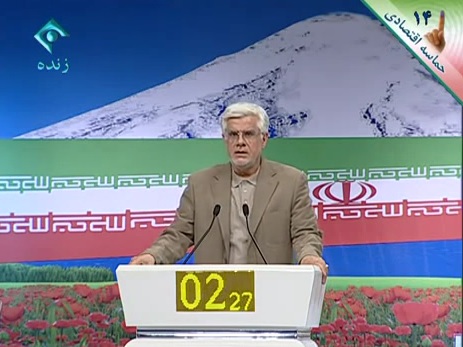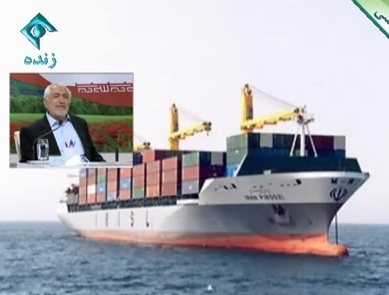 At the first presidential debate on May 31, Iran’s eight candidates spent more time arguing over the quiz show format than debating each other. Tensions erupted when the moderator asked yes-or-no and multiple choice questions. “I’m not answering these questions,” said Mohammad Reza Aref (left). “I answered test questions 40 or 50 years ago.” Hassan Rouhani scolded the moderator, warning that the public also probably found the format “offensive.” The television station should have consulted with each candidate’s staff beforehand, said the cleric. Mohsen Rezai complained that the program did not allow candidates to engage directly with each another. Saeed Jalili and Gholam Ali Haddad-Adel refused to answer the questions. The moderator gave up after question eight, reportedly leaving 16 questions unasked.
At the first presidential debate on May 31, Iran’s eight candidates spent more time arguing over the quiz show format than debating each other. Tensions erupted when the moderator asked yes-or-no and multiple choice questions. “I’m not answering these questions,” said Mohammad Reza Aref (left). “I answered test questions 40 or 50 years ago.” Hassan Rouhani scolded the moderator, warning that the public also probably found the format “offensive.” The television station should have consulted with each candidate’s staff beforehand, said the cleric. Mohsen Rezai complained that the program did not allow candidates to engage directly with each another. Saeed Jalili and Gholam Ali Haddad-Adel refused to answer the questions. The moderator gave up after question eight, reportedly leaving 16 questions unasked.
 The debate— nearly four hours on the economy —had other unique aspects, including set-up. Candidates appeared caught off guard when asked to react to a series of pictures. One photo of a patient after surgery led to discussion about Iran’s health care system—and the need for various improvements. Shown a picture of cars stuck in traffic, candidates argued over how much carbon monoxide contributed to pollution. The moderator also showed pictures of a cargo ship, tractors in a field, an empty mine, a clock and a bazaar.
The debate— nearly four hours on the economy —had other unique aspects, including set-up. Candidates appeared caught off guard when asked to react to a series of pictures. One photo of a patient after surgery led to discussion about Iran’s health care system—and the need for various improvements. Shown a picture of cars stuck in traffic, candidates argued over how much carbon monoxide contributed to pollution. The moderator also showed pictures of a cargo ship, tractors in a field, an empty mine, a clock and a bazaar.  In another part of the debate, the moderator posed a random question to each candidate and gave him three minutes to answer from behind a podium. The other seven candidates then had two minutes to respond from their seats.
In another part of the debate, the moderator posed a random question to each candidate and gave him three minutes to answer from behind a podium. The other seven candidates then had two minutes to respond from their seats.
